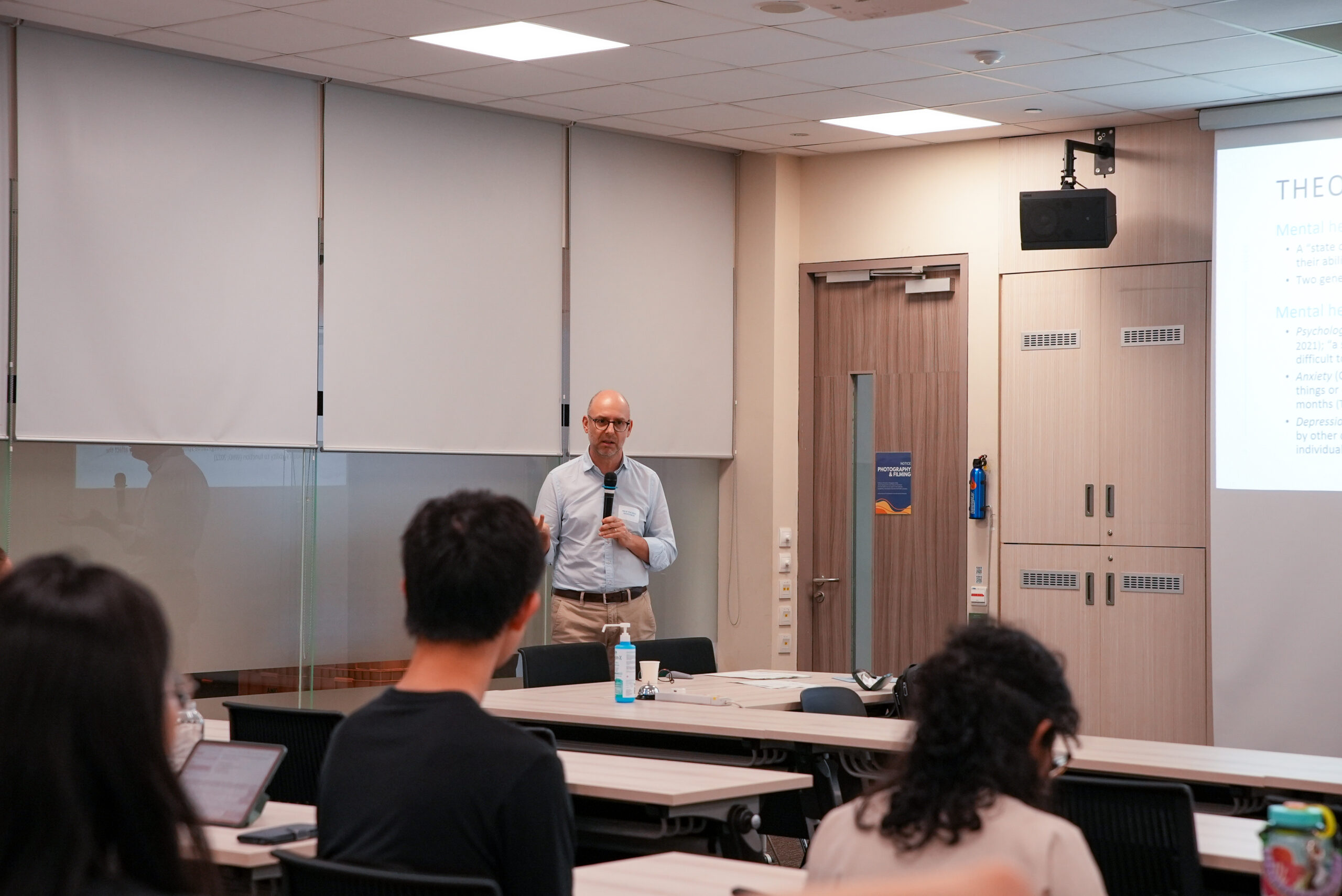NUS CNM Distinguished Lecture | Burning (Out) for Academia
February 24, 2025
The NUS Department of Communications and New Media launched its annual Distinguished Speaker series on Thursday, 20 February 2025, with an engaging, relatable presentation by Professor Thomas Hanitzsch titled ‘Burning (Out) for Academia’. Prof Hanitzsch, a former journalist who teaches at Ludwig Maximilian University (LMU) Munich in the Department of Media and Communication, is also the incoming President of the International Communication Association (ICA) and an ICA Fellow. The talk took attendees through his groundbreaking study on burnout among academics in the fields of media and communications, which was carried out by a team of three professors – Prof Hanitzsch, his wife and colleague Prof Antonia Markiewitz, and Prof Henrik Bedker from Aarhus University – and their graduate students.
Prof Hanitzsch introduced the study by noting that it had long been taboo to discuss mental health in academia, including in media and communication, where it had been misconstrued as a sign of weakness while it actually is a sign of strength. He had been fortunate not to experience burnout early in his academic career, and it was only in 2020 during the pandemic, when he was a successful, tenured professor, that he began feeling drained and unmotivated. Prof Hanitzsch had realised his dream of becoming an ICA Fellow that year and remarked that he was “saved” by his circle of supportive colleagues and loved ones, as well as his tenure protections. When he shared his experience of burnout with other academics, they could immediately relate, and thus the idea for the research project was born.
When the project was kicked off early in 2022, there was no information on the scale of the burnout problem among communication and media studies scholars. After performing a literature review of mental health in academia which drew on studies from organisational psychology and articles in the popular and academic press, and selecting the job demands-resources (JRD) model as the study’s framework, the team developed a questionnaire that included questions about mental health as well as a range of contextual factors such as job demands, organisational support, job satisfaction, social media use, and workplace environment. The survey was completed by 1,028 academics who were members of communication associations such as the European Communication Research and Education Association (ECREA), International Association for Media and Communication Research (IAMCR), Association for Education in Journalism and Mass Communication (AEJMC), and Latin American Association of Communication Researchers (ALAIC); 300 follow-up qualitative interviews were conducted with respondents.
The respondents – 67% of whom were female – ranged from early career academics, which made up the majority and included doctoral students, to mid- and late-career academics. Their mean age was 43 and 76% were on full-time employment. Among the findings, 62% (six out of ten) reported experiencing mental health issues, with the majority being early career researchers on non-permanent employment, while one in four reported that they were in very good or excellent mental health. The data also indicated that 38% of respondents were likely to suffer from a moderate to severe mental disorder, and one out of two reported that the pandemic increased their psychological distress. In addition, half experienced symptoms of imposter syndrome, three quarters found it difficult to balance their professional and private life, a third possessed symptoms of moderate to severe anxiety, 36% had moderate to severe depression, and 43% were at severe to very severe risk of burnout. Furthermore, 44% said that they had considered leaving academia within the next year. Despite this, academics indicated that they were most satisfied with the meaningfulness of their profession and the sense of accomplishment in their research.
Overall, early-career researchers, female researchers, and those in non-permanent positions are substantially more vulnerable to mental health issues, and the structural conditions of academic labour create considerable stress on mental wellbeing. Prof Hanitzsch emphasised that the findings should be taken as an invitation for academic institutions and their leadership, as well as individual researchers, to seriously reflect on improving the academic work environment. Among his recommendations are that institutes of higher education and academic associations should invest more resources into mental health support structures, boost mental health advocacy, and build communities to help researchers share their experiences. Individuals are advised to increase their mental health literacy, combat self-exploitation and overcommitment, build up their resilience, and develop healthy coping strategies. Prof Hanitzsch also underscored that changes in the structural conditions of academic labour were necessary, including reducing its precarity, reliance on quantitative indicators of academic performance, and pressure to obtain and produce an unreasonable number of grants and publications. Finally, Prof Hanitzsch called for change in academic culture, where a “culture of caring” was cultivated and awareness of inequity and intersectionality in academia was raised. This would go a long way in promoting research that is “disruptive” and “revolutionary” over that which is safe and normal.
A report on the study, ‘Publish and perish: Mental health among communication and media scholars’ (Journal of Communication, Dec 2024) can be accessed here. More information on the seminar is available here.


